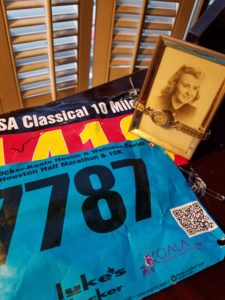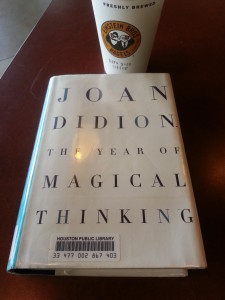Why I run.

You had so many steps left to take, Mom, but you died too young.

I run for you. To give you voice. To say you existed, and that you mattered.

“Life changes fast.
Life changes in the instant.

You sit down to dinner and life as you know it ends.
The question of self-pity.”
These were the first words Joan Didion wrote after it happened, as she tells us in the first line after these words in her amazing book, The Year of Magical Thinking.
The “it” in the follow-up words to the first words refers to her husband, John Dunne’s, death.
That these words appear at the very start of this remarkable homage to grief is important, as they are repeated in various renditions throughout the book.
Joan Didion’s husband, with whom she had shared most moments of most of her adult life, had died of a massive heart attack, just as they had sat down to dinner, and hence, the reference to life changing in an instant.
My own mother’s death, though extraordinarily premature, did not happen in an instant. We had not just sat down to dinner when life as I knew it ended.
In fact, my mother was sick for much of my teenage years, and lost her valiant fight against breast cancer a mere two weeks after I turned 18.
Joan Didion struggled to come to terms with getting through the remainder of her years without the man with whom she had spent most of her life.
I, on the other hand, have spent most of my life without my mother–sometimes coming to terms with that fact better than at other times.
Joan Didion is the author of five novels, and one of America’s most celebrated authors. She is so skilled a writer that she makes it safe for us to look up close and personal at a subject as potentially overwhelming as grief.
It’s almost if we’re all taking this journey through the first year after Joan Didion’s husband died–together.
Days play a vital role in the story of the year following the death of Joan Didion’s husband.
We learn, for instance, of the importance of the day an editor came to dinner in so far as her husband was alive on that day. Holidays are merely a few of the other powerful ways in which Ms. Didion used the concept of days to help her make sense of the reality of her life partner leaving her just as they were sitting down to dinner.
With eloquence and grace, defiance and acceptance, Ms. Didion deftly tells us–and surely herself– how she ultimately came to terms with her husband’s death.
 Such a History
Such a HistoryBack in the 1960s, when Montrose in Houston was still “The Montrose,” there arose from the heart of it, a ten-story office building.
Atop those ten floors sat a sky-bar. The lounge offered breathtaking views, I’ve been told, of the iconic Houston skyline.
From what I’ve also heard, it was a special place to relax and listen to great jazz or salsa.
And then, one day, the music stopped.
I like to think that if I had really, truly appreciated my rich heritage when I was younger, I might have saved myself countless hours of envy. Instead of bemoaning my curly hair, or my prominent nose, I might have instead seen in them traces of my resilient Dutch roots, roots strengthened by long winters first in Amsterdam, and then, in New Amsterdam.
Instead of wishing I had a more exotic complexion, I might have relished the common thread I shared with those first Dutch settlers who braved the endless days at sea crossing the Atlantic–without the benefit of sunscreen.
For, long before vertical showcases poked at the Manhattan sky, long before private jets brought captains of international businesses gliding into the gleaming metropolis, and long before the streets of lower Manhattan were paved with proverbial gold, a ship arrived, and with it, a man who was one of the founders of New Amsterdam, today’s New York. This man was also my great, great, great, great, great, great, great, grandfather.
Abraham Pietersen arrived in the New World in 1631. A miller by trade, he was one of the first 300 Dutchmen to settle New Amsterdam.
In a wonderful New York Times article, entitled “The Van Dusens of New Amsterdam,” the author elevates Abraham Pietersen, saying that “it all began with Abraham,” alluding to the Old Testament Abraham. The Dutch Abraham was born in the town of Duersen, in Brabant, Holland, and hence, the name in its many variations all trace back to the village of Duersen.
I have Presidential royalty in my Dutch blood. It turns out that the great aunt of Martin Van Buren, the 8th U.S. President, was my great, great, great, great, great, great, great grandmother, Cornelia. That makes Martin Van Buren my distant cousin.
When I look at the image of Martin Van Buren, I see traces of my father. The nose, the curly hair, the intelligent eyes. And I see traces of myself. I can continue to wish I didn’t have curly hair, or that I had a more refined nose. Or, I can celebrate these attributes as reminders of my connection backward through time. I am so much more than what I see in the mirror. Among many other things, I am the best—and the worst—of every one who has come before me.
Sometimes, it’s the little things. A song we listened to together. A photo of her favorite beach. Or, a chance sighting of a pair of sunglass clip-ons. My mom was forever searching for her clip-ons.
Yes, sometimes it’s the small things that hold the strongest memories for me.
It’s been almost forty years since she died. That self-detected lump in her breast led to a radical mastectomy and chemotherapy and hair loss. But the malignancy would not be defeated.
Within two years, I would take her on her last car drive, to South Coast Community Hospital in South Laguna Beach. By that time, the cancer had spread to her bones, and it was all the doctors and nurses could do to keep her from passing out in pain.
I was a teenager when she died, so I’ve spent the better part of my life with only the memories of her to provide a mother’s closeness. Those memories have been a poor substitute: a memory doesn’t have a shoulder to cry on, and can’t offer a word of encouragement. Nor can a memory tell you to “break a leg” or “show ‘em all you know.”
And yet, sometimes the little things triumph, bringing her back into focus. Today I am wearing one of those plastic bracelets they give you at the hospital; the nice lady in Admissions gave me one today at the hospital outpatient center where I go for my annual mammogram, a talisman against the cancer that struck down my mother.
The last time I saw her alive, which was the moment she took her last breath, she, too was wearing one of those plastic bracelets. Today, I look at my wrist inside of the plastic bracelet, and I imagine her wrist inside of her plastic bracelet. That little thing, that shared experience brings me comfort.